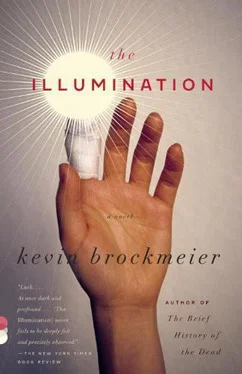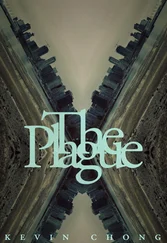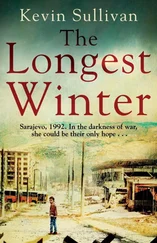If she remained absolutely still, she thought, then maybe, just maybe, she would fall asleep again, and she lay on her side for a while watching the bands of light travel up her arm. When she realized the cause was hopeless, she got up to use the bathroom. After she was finished, she made the mistake of reaching for the faucet with her left hand and was hit by a jolt of pain so severe that her legs locked upright and she had to Frankenstein-walk back to her bed. It took a long time for her knees to loosen up, and even longer for the glow in them to subside.
Shortly after the sun rose, an orderly brought her a breakfast of orange juice and scrambled eggs. A nurse followed behind him with a chaser of blue pills. A few hours later, Dr. Alstadt found her staring out the window at the cars on the freeway, just sedated enough to be comfortable but just sober enough to be clearheaded. “Hello, Carol Ann,” he said. He reached out as if to take the loop of hair that was dangling over her eye and brush it back with his fingers, then thought better of it and dropped his hand. “How are you holding up?”
“Where’s Dr. Barrettes?”
“Dr. Barrettes?” He looked at her chart. “You mean Dr. Clovis. ‘Dr. Barrettes’—that’s good. Dr. Barrettes has gone home for the day. So, Carol Ann, I want to talk with you about what you said to me after the operation,” which made no sense, none at all. She would have remembered if she had seen him after the operation, and she hadn’t.
He gave her a quizzical look and pulled a chair up to her bed. “You don’t remember, do you? That happens sometimes when you’re still shaking off the effects of the anesthesia. Carol Ann, I sat here in this room with you for almost an hour yesterday. You were only half-awake, but you said something that implied your ex-husband had caused your injury. I’d like to know if that’s true.”
“What did I say?”
“Well, you were in kind of a daze. You kept talking to him about your alimony check. You said, ‘You didn’t love me. You didn’t even like me,’ and then, ‘Are you happy now, you sad—?’ You repeated the word sad a few times. I think you were trying to say sadist. ‘ Are you happy now, you sadist? It nearly lopped my thumb off.’ ”
She felt her face coloring—something that hardly ever happened to her now that she was an adult. She told him the story of the carving knife and the tape-sealed package and how she had found her alimony check buried beneath a pile of wood curls. “So I guess he did cause my injury, yes, in a roundabout way, but really it was my fault. One stupid mistake, and …” She made a sound she did not think she had ever made before, a sigh like the beginning of all sighs.
“Well, concerning that,” Dr. Alstadt said. He told her about the physiotherapy she would need after her wound had healed—“not a lot, but some. The thumb is important. You can expect to lose about twenty percent of the function in your left hand. Twenty percent might not sound like much, but you’ll probably have to learn a new way to tie your shoes, for instance. Brush your teeth. Trim your garden—do you garden? Hold a knife and fork.”
The prospect of resuming her life after she left the hospital depressed her. Dr. Alstadt perched his glasses on his eyebrows and rubbed his eyes with his index fingers. He still wore a barely visible aura of emotional turmoil. She wondered where it came from. “Yesterday in the gas station you said you were having a bad day at work. You look like you’re having another one.”
“That’s nothing you need to worry about. I’d rather talk about you.”
“I’ve been learning how to tie my shoes and use a fork without my thumb for two weeks now, remember?”
He paused, made a decision, nodded. “Right. Well. The situation is that the hospital is facing a budget crunch. We either have to cut hours or cut jobs. I’m supposed to make the decision for the A&E.”
“Arts and entertainment?”
“Pardon? Ah. No. Accident and emergency.”
“So what are you going to do?”
“Make life a little harder for everyone, as opposed to a lot harder for someone. The staff won’t be happy about it, but I’ve weighed all the options, and it seems like the one that will do the least harm. You know, ‘First do no harm’ and all.”
“That sounds like the responsible choice.”
“Yes. Well. Nobody can say I’m not conscientious. It might be my one shining virtue.”
“What’s your one shining vice?”
He amused her by pondering the question. “Nostalgia,” he answered eventually, and a few seconds later, “Self-pity.”
“I think we share a shining vice.”
She spent another day lost in pain and reverie, staring at the patients bearing their light past her door and dozing off between outbursts of noise from the television. Every so often someone would arrive to feed her, medicate her, or change her bandages, and if she was sleeping she would rouse herself, and if she was hurting she would try to hide it. The tip of her thumb was gathered together in a smart little pucker around her stitches. She could only presume that, like a sausage, it had been hollowed out to make room for the skin to close. There was a fairy tale that had disturbed her when she was a child, too young for school, and she thought about it now, the one about the quarreling couple who waste all their wishes attaching sausages to each other’s noses. Her mother used to read the story out loud to her, and whenever she reached the illustration of the poor wife tugging at the sausage on her nose, a look of cross-eyed fury on her face, Carol Ann insisted that she turn the page. She always rushed to put the book away the second the story was finished. There it would stand on its shelf, giving out an aura of indignation and menace, just as her teddy bear gave out an aura of sleepy affection, her toy box an aura of cheerful excitement, but the book was fixed against the backdrop of her room, and it had been for as long as she could remember, and it never occurred to her that she could simply get rid of it. She must have fallen asleep while the nurse was working over her because she seemed to spend the next few hours locked in a small stone house with her husband, the two of them trading wishes like insults. She woke up just in time to see the same orderly who had watched her claim the journal a couple of weeks ago take a few steps into the suite, shake his head as he realized who she was, and say, “Perfect. Just great. Wrong room.”
That evening, before he left for home, Dr. Alstadt stopped by to ask her how her day had gone—and also, she could tell, to allow her to ask about his. Somehow, without trying, over a scant few conversations, they had transformed themselves in each other’s eyes from doctor and patient to two fragile human beings, both afflicted by nostalgia and self-pity. When she asked him how everything had gone in the field of arts and entertainment, he said, “About how I expected it would. Everyone hates me a little, but no one hates me passionately.” He reached up to grip his shoulder, rolling his head in a slow circle. She saw a dozen vines of light swaying on the back of his neck. They were thicker than the ones she had noticed before, and he said, “Ah, yes, my neck. It always gets like this by the end of the day.”
“Turn around.”
He must have thought she wanted to take a closer look at the spot because she surprised him by using her good hand to work the tension out of his muscles. Each white tendril grew brighter as she bore down on it with her fingers, then much softer as she eased away. When she was finished, Dr. Alstadt made a tiny halting sound of pleasure.
She was in the hospital two more nights before he allowed her to go home.
I love the photograph of you your parents keep by the front door, that little girl in her glasses and her Holly Hobbie dress. I love the way you kiss. I love the way you shake your head when you yawn. I love the “magically delicious” doodles you make when you’re talking on the phone: stars, moons, hearts, and clovers. I love to look up and see you sitting beneath the lamp in the living room—reading a book, or staring out the window, or chewing the end of a ballpoint pen. I love how soft your hands are, even though hand lotion is disgusting goop and you’ll never convince me it isn’t. I love the way you line your brushes up on the vanity like silverware. I love knowing that if there’s a restaurant I want to try, I’ll get to try it with you; if there’s a movie I want to see, I’ll get to see it with you; if there’s a story I want to tell, I’ll get to tell it to you. I love your giggle fits. I love the names you’ve had picked out for 25 years: “Mira” if it’s a girl, “Henry” if it’s a boy .
Читать дальше












